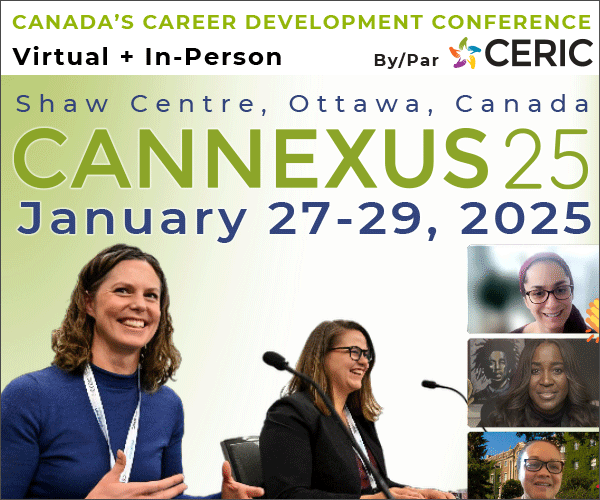Career Development of Working Mothers: Helping and Hindering Factors in Doing Well During the COVID-19 Pandemic
DOI:
https://doi.org/10.53379/cjcd.2024.383Keywords:
working mothers, covid-19, enhanced critical incident technique, qualitative research, career developmentAbstract
Women’s career development amid the COVID-19 pandemic suggests that we may be facing a ‘female recession’, where women are at significantly increased risk for dropping out of the workforce with the gender gap in the workplace likely to grow. However, the pandemic may have presented opportunities for working mothers to engage creatively in personal career decisions due to increased opportunities to work flexibly and pivot in a very quickly changing labour market. This qualitative study used the enhanced critical incident technique to explore the intersection of working mothers and career development considering the COVID-19 pandemic. Participants for this study were a sample of 18 working mothers in North America and Australia. Key factors that were identified as helping women do well in their career development during COVID-19 included: Supportive workplaces, social support, personal protective factors, job market factors, and resources (predominantly financial). Hindering factors to working mothers’ career development included: workplace challenges, family challenges, personal stressors, job market factors, COVID-19 mandates and restrictions, and childcare. The findings from this study help elucidate factors that contribute to a meaningful and productive career so that clinicians and other professionals can support, advocate, and encourage women who remain working during motherhood.
References
Akanji, B., Mordi, C., Ajonbadi, H., & Adekoya, O. (2022). The impact of COVID-19 on the work–life balance of working mothers: evidence from Nigerian academics. Personnel Review, 52 (3), 703-723. https://doi.org/10.1108/PR-08-2020-0636
Andersson, B., & Nilsson, S. (1964). Studies in the reliability and validity of the Critical Incident Technique. Journal of Applied Psychology, 48(6), 398-403. https://doi.org/10.1037/h0042025
Ashman, R., Radcliffe, L., Patterson, A., & Gatrell, C. (2022). Re‐ordering motherhood and employment: mobilizing ‘Mums Everywhere’ during Covid‐19. British Journal of Management, 33(3), 1125-1143. https://doi.org/10.1111/1467-8551.12630
Blustein, D. L., Smith, C. M., Wu, X., Guarino, P. A., Joyner, E., Milo, L., & Bilodeau, D. C. (2022). “Like a tsunami coming in fast”: A critical qualitative study of precarity and resistance during the pandemic. Journal of Counseling Psychology, 69(5), 565-577. https://doi.org/10.1037/cou0000615
Borgen, W. A., & Amundson, N. E. (1984). The experience of unemployment. Nelson.
Butler, J. (2012). Precarious life, vulnerability, and the ethics of cohabitation. The Journal of Speculative Philosophy, 26(2), 134–151. https://doi.org/10.5325/jspecphil.26.2.0134
Butterfield, L. D., Borgen, W. A., Amundson, N. E., & Maglio, A. S. T. (2005). Fifty years of the critical incident technique: 1954-2004 and beyond. Qualitative research, 5(4), 475-497. https://doi.org/10.1177/1468794105056924
Butterfield, L. D., Maglio, A. S. T., Borgen, W. A., & Amundson, N. E. (2009). Using the enhanced critical incident technique in counselling psychology research. Canadian Journal of Counselling and Psychotherapy, 43(4), 265-282.
Canadian Standards and Guidelines for Career Development Practitioners. Glossary of Career Development Terms. 2012. http://career-dev-guidelines.org/career_dev/wp-content/uploads/2011/11/Glossary-of-Terms-changes-from-CD-Chapter-re-counselling.pdf
Catalyst (2020, Dec 8). The Detrimental Impact of Covid-19 on Gender and Racial Equality (Quick Take). https://www.catalyst.org/research/covid-effect-gender-racial-equality
Clark, S., McGrane, A., Boyle, N., Joksimovic, N., Burke, L., Rock, N., & O’Sullivan, K. (2021). “You’re a teacher you’re a mother, you’re a worker”: Gender inequality during COVID‐19 in Ireland. Gender, Work & Organization, 28(4), 1352-1362. https://doi.org/10.1111/gwao.12611
Como, R., Hambley, L., & Domene, J. (2021). An exploration of work-life wellness and remote work during and beyond COVID-19. Canadian Journal of Career Development, 20(1), 46-56.
Delaney, R. K., Locke, A., Pershing, M. L., Geist, C., Clouse, E., Debbink, M. P., ... & Fagerlin, A. (2021). Experiences of a health system’s faculty, staff, and trainees’ career development, work culture, and childcare needs during the COVID-19 pandemic. JAMA network open, 4(4). http://dx.doi.org/10.1001/jamanetworkopen.2021.3997
Dizaho, E. K., Salleh, R., & Abdullah, A. (2016). The impact of work-family conflict on working mothers’ career development: A review of literature. Australian Journal of Basic and Applied Sciences, 10(11), 328-334.
Flanagan, J. C. (1954). The critical incident technique. Psychological Bulletin, 51(4), 327–358. https://doi.org/10.1037/h0061470
Grenier, A., Phillipson, C., & Settersten, R. A. (Eds.). (2020). Precarity and ageing: Understanding insecurity and risk in later life. Policy Press.
Han, C. (2018). Precarity, precariousness, and vulnerability. Annual Review of Anthropology, 47, 331–343. https://doi.org/10.1146/annurev-anthro-102116-041644
Kalleberg, A. L. (2018). Job insecurity and well-being in rich democracies. Polity Press.
Lorey, I. (2015). State of insecurity: Government of the precarious. Verso Books.
Mäkelä, L. (2009), Representations of change within dyadic relations between leader and follower: discourses of pregnant followers. Leadership, 5(2), pp. 171-92.
McIntosh, B., McQuaid, R., Munro, A., & Dabir‐Alai, P. (2012). Motherhood and its impact on career progression. Gender in Management, 27(5), 346-364. https://doi:10.1108/17542411211252651
McKinsey & Company (2021, May 5). For mothers in the workplace, a year (and counting) like no other. https://www.mckinsey.com/featured-insights/diversity-and-inclusion/for-mothers-in-the-workplace-a-year-and-counting-like-no-other#
McQuaid, R.W., Bond, S. and Fuertes, V. (2009), Working for Families Fund Evaluation (2004-08), Scottish Government, Edinburgh. https://dera.ioe.ac.uk/1393/2/0080320.pdf
Murphy, L. D., Thomas, C. L., Cobb, H. R., & Hartman, A. E. (2021). A review of the LGBTQ+ work–family interface: What do we know and where do we go from here?. Journal of Organizational Behavior, 42(2), 139-161. https://doi.org/10.1002/job.2492
Richardson, M. S. (2012). Counseling for work and relationship. The Counseling Psychologist, 40(2), 190-242. https://doi:10.1177/0011000011406452
Standing, G. (2011). The Precariat: The new dangerous class. Bloomsbury.
Tronto, J. (2009, March). Democratic care politics in a world of limits. Keynote address to the conference of the United Nations Research Institute for Social Development, New York, NY.
Waldfogel, J. (2007). Parental work arrangements and child development. Canadian Public Policy/Analyse de Politiques, 33(2), pp. 251-72.
Wang, Y. C., Shelley Tien, H. L., & Wu, C. L. (2018). The relation of career adaptability to work–family experience and personal growth initiative among Taiwanese working parents. Journal of Employment Counseling, 55(1), 27-40. https://doi.org/10.1002/joec.12071
Warren, S., & Brewis, J. (2004). Matter over mind? Examining the experience of pregnancy. Sociology, 38(2), 219-236. https://doi.org/10.1177/0038038504040860
World Health Organization (2020). WHO director-general’s opening remarks at media briefing on covid-19 March 11. https://www.who.int/director-general/speeches/detail/who-director-general-s-opening-remarks-at-the-media-briefing-on-covid-19---11-march-2020

Additional Files
Published
How to Cite
Issue
Section
License
Copyright (c) 2024 Canadian Journal of Career Development

This work is licensed under a Creative Commons Attribution-NonCommercial-NoDerivatives 4.0 International License.














